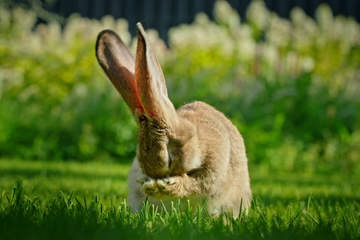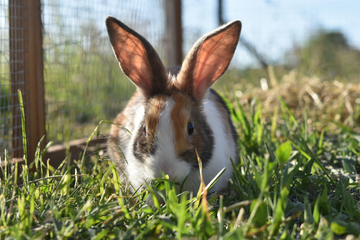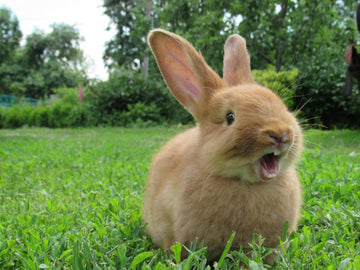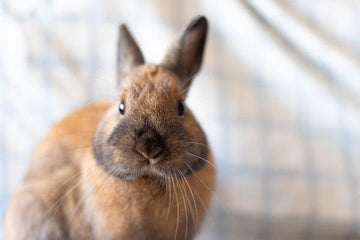How to Clean a Pet Rabbit's Bum
When feces collect on rabbits' bums, the odor attracts blowflies. These flies then lay their eggs in the hot, warm poo stuck to your bunny's nether regions. Within hours, the eggs hatch into hungry maggots, which start eating away your poor bunny's flesh.
Click Here For a Guide to Understanding Your Rabbits Diet.

This parasitic infection is called myiasis, or more commonly, flystrike. Not only is this condition incredibly painful for rabbits, dogs, cats, and many farm animals subject to its symptoms, it can quickly cause the animal to go into shock. Myiasis can be fatal if left untreated.
Why Does My Bunny Have a Dirty Bum?
When you clean your rabbit's litter box or cage, you see a bunch of dry pellets that are mostly odor-free. But if you've ever observed your bunny late at night in their darkened quarters, you might observe an odd behavior -- your bun is eating its own poo.
This is completely normal, healthy, and necessary for a healthy rabbit diet. While you may see them eating their feces during the day, it most often occurs during the night. These special feces are called cecotrophs. While eating slimy cecotrophs seems disgusting to humans, they contain the nutrition rabbits need, but that has not yet been absorbed. The second trip through your bun's digestive system will allow it to absorb the ingredients its system previously expelled.
An older bunny may no longer be limber enough to reach around and eat its cecotrophs. The same can be said for a bun that's overweight or ill. To keep them on a healthy diet, order farm-fresh hay that can be shipped straight to your door.
What's the Best Method of Bum-Cleaning?
To clean your bunny's soiled bottom most efficiently, observe the state of the feces clinging to their hindquarters. Has it had time to dry or harden? If so, your easiest cleanup involves sprinkling a liberal amount of cornstarch around the areas of the fecal matter and then brushing it off. Since the feces may be stubbornly stuck to your bun's fur, don a pair of latex gloves, and work the cornstarch gently into the fur surrounding the clump of dried poo.
As you can imagine, your bunny might be quite indignant at this type of treatment. But a well-socialized rabbit should still allow its owner to pick them up to give them affection and do necessary grooming tasks.
It's All About How You Hold Them
Pick your rabbit up gently. It's wise to wear an old T-shirt to avoid a mess on a good outfit. Cradle your bunny to your chest with its front paws supported by one hand while the other supports their lower body. Be prepared for them to wriggle and kick out with their hind legs. Hold them firmly but gently and try to finish fast. Try holding them affectionately for a little while before attempting poo removal. This can help ease their anxiety.
When the Poo Is Wet
Like cats, bunnies are not fans of baths. In fact, baths can actually harm your rabbit. So, rather than a bath, you will just be spot cleaning your bunny's bum. Prepare several bowls of warm, (not hot or cold) sudsy water using a capful of special rabbit shampoo (purchase pre-made or make your own!). Also, set up another bowl with just warm water but no shampoo to rinse off the shampoo and any residue.
Holding your bun in the manner described above, gently lower their dirty bum into the water. With your gloved hand, work through the poo-covered fur to loosen it. As the water gets dirty, switch to a clean bowl.
Work swiftly but steadily, talking to your bunny all the time in soothing tones. Once your rabbit is washed and rinsed, you must thoroughly dry off the fur. Use a towel first, but towel-drying is often insufficient. Then, use a hair dryer at low speed on a warm setting. Don't get close enough to burn your bun's tender, exposed skin.
As you can imagine, this poo-removal operation can be quite traumatic for bunnies. If this problem becomes frequent make an appointment to see your vet as there may be something in their diet that's causing it or they may be lacking something in their diet (like fresh grass hay).

"Why Is My Rabbit Licking Her Own Pee?"

Rabbit Is It Low Maintenance or More Work Than You Think?

Tips to Manage Rabbit Chewing Habits







